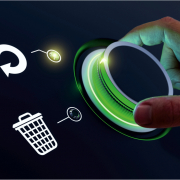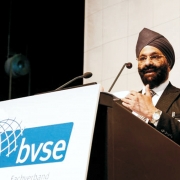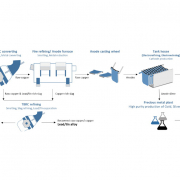Middle East “Being Transformed” by Producers’ Sustainability Drive
The increasing trend for primary producers to transition towards secondary metal feedstocks and more sustainable production processes was reinforced at the BIR Non-Ferrous Metals Division meeting in Dubai on 18 October, 2022.
Presentations from two leading non-ferrous operators in the United Arab Emirates underlined this switch towards scrap, renewable energy sources, and customers increasingly prepared to pay a “green” premium to meet net zero targets.
Fadi Awadhalla, Vice President, Casthouse, part of Emirates Global Aluminium (EGA), set out EGA’s drive to become a global sustainability leader for the aluminium industry and to produce only Aluminium Stewardship Initiative-certified products by 2030. By 2050, EGA aims to reach net zero greenhouse gas emissions throughout both its operations and its supply chain (scope 1, 2 and 3). This would mean “vastly increasing production of CelestiAL, the world’s first metal produced with solar power”. Over 40,000 tonnes was going to carmaker BMW, “but all the automotives want it” and are prepared to pay for the premium product, he said.
From 2024, the company is planning a 150,000 tonnes-per-year recycling facility in UAE, producing billet from both post-consumer and pre-consumer scrap and also exploring a re-melt facility of around 30,000 tonnes per year. Mr Awadhalla said EGA may also develop recycling capacity nearer its customers, especially in Europe and North America, either alone or in partnerships, clearly creating opportunities for scrap supply.
“We are new to this and we want to learn,” he told attendees. “10 years ago, if someone suggested recycling, I’d have said: ‘It’s nice meeting you – but this is not our business.’ Now, all the primary producers are looking at recycling whether they like it or not.”
DMB, part of the Ducab metals group, specialises in high-grade aluminium and copper products, 75% of which is exported. Senior plant manager Abdullah El Doukhei said the company started using scrap in 2017 and the proportion rose to 25% by 2020. It had dipped slightly during the Covid pandemic but the company was planning on much higher numbers. Mr El Doukhei identified the challenges for scrap as being fluctuating volumes and inconsistent quality, particularly with impurity levels in recycled copper. “We need a quality commitment from the market,” he insisted.
During questions, it was suggested that the LME should have separate trading for “green” and non-green metals. Mr Awadhalla said: “EGA, long- term, would prefer the basic LME trading to be green. Anything not green should be discounted”. He added that customers around the world were refusing to sign contracts for 2025 unless they could be guaranteed to receive low-carbon aluminium products.
Although CelestiAL was made using solar energy, Mr Awadhalla said EGA still predominantly used gas to power its plants. Its current CO2 equivalent per tonne is 7-8 but, as production shifts from gas, the aim is to get that figure below 4 by 2030 and below 2 by 2050.
Commenting on both presentations and the region’s growing preference for scrap and sustainable production, divisional President Dhawal Shah of Metco Ventures LLP in India said he could see “how transformational the Middle East landscape is going to become”. He concluded: “You can see the change and the dynamic – it’s what the future looks like.”
Omar Al Sharif of the Sharif Metals Group in the UAE was also impressed by the scrap transition: “It’s such an extraordinary platform to praise the recyclers and suppliers, and to have the feedstock right into your finished products. This rhetoric is not something we’ve been accustomed to so we’re proud we are meeting that green level of communication.”
Earlier, a markets report from divisional board member Sebastien Perron of Labrador Recycling in the US, based on the latest BIR Mirror, noted that until recently business conditions for the secondary non-ferrous metals industry had remained generally positive. Today, however, mounting geopolitical tensions and macro-economic issues “had conspired to create a far more challenging playing field”. To make matters worse, he said, some countries had become more inward-looking and were considering policies that run counter to the spirit of free trade.
Source: BIR (Brussels, October 21, 2022)








